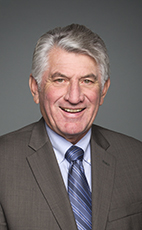Madam Speaker, I am happy to rise today to address the questions regarding the Canadian Security Intelligence Service. As the member is undoubtedly aware, CSIS is tasked with collecting, analyzing and reporting information and intelligence to the Government of Canada on threats to the security of Canada.
According to the CSIS Act, CSIS operates primarily to address four distinct security threats against Canada. The first threat is espionage or sabotage that is against Canada or is detrimental to the interests of Canada.
The second threat is foreign-influenced activities within or relating to Canada that are detrimental to the interests of Canada and are clandestine or deceptive or involve a threat to any person.
The third threat is activities within or relating to Canada directed toward or in support of the threat or use of acts of serious violence against persons or property for the purpose of achieving a political, religious or ideological objective within Canada or a foreign state, essentially terrorism. We are all well aware of the threat that terrorism poses to Canada and our allies in this post-9/11 world.
Finally, the fourth threat is activities directed toward undermining or overthrowing the Government of Canada.
The member seems to be most concerned with the second threat, that of foreign interference in Canada, and that is what I will address here today.
Parliament recognized foreign interference as being a concern when CSIS was created in 1984 and therefore explicitly included foreign interference as a distinct threat to the security of Canada in the CSIS Act. The reason is clearly because Canadians are often the victims of foreign interference. In this respect, the focus of CSIS is on investigating the offending foreign state and its agents.
It is clear that CSIS has a mandate to investigate these activities and it has informed successive governments of such threats, including through its annual public reports.
Canada is a particularly inviting target for foreign interference because of the values that make it great. We are a free, open and tolerant society that is open to the world, a country that welcomes people from all corners of the earth.
Similarly, Canada's record of technological innovation, whether it be telecommunications or the mining sector, remains attractive to foreign governments who do not have Canada's or Canadians' best interests at heart. They would seek to steal the hard-earned technological innovations of Canadian companies that make this country's economy the envy of the world.
Organizations like CSIS stand on the front lines of the Canadian intelligence community to protect Canada, the Canadian economy and Canadians from hostile foreign interference.
I am sure I can speak for all members when I say that we thank CSIS and our law enforcement community for their service to their country and keeping Canadians safe.

